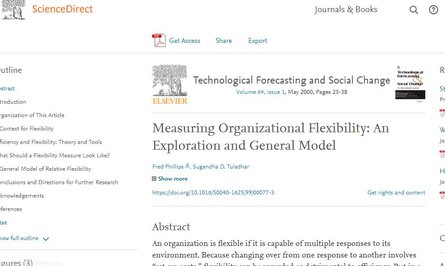
An organization is flexible if it is capable of multiple responses to its environment. Because changing over from one response to another involves “set-up costs,” flexibility can be regarded as detrimental to efficiency. But in a time of globalization and rapid change in business, companies must attend to agile response (flexibility) as much as to efficiency. Efficiency can be measured by several techniques, including Data Envelopment Analysis (DEA). There is, however, no accepted, operational, and useful measure of organizational flexibility. This article characterizes the properties such a measure would have. Following some scene-setting discussion of the roles of efficiency and flexibility in theories of economics, evolution, and general systems, a general model of (relative) flexibility is proposed, building on Ashby's [1] definition of the variety that must be generated by a sustainable system. A special case of this model is applied to 10 years of financial data on 44 computer and computer-related companies. Results show that companies scoring high on a flexibility measure achieve more consistent efficiency over the time span studied. Discussion indicates how a flexibility model can complement DEA studies to round out the characterization of corporate performance.